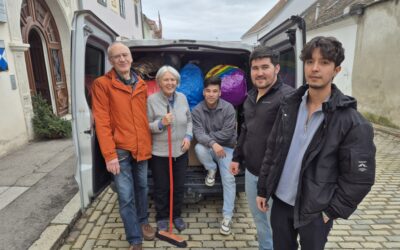 “‘The Mine’ was set up in 2003 adhering to the principles of the Economy of Communion which Chiara Lubich launched in 1991. She was the one who called it ‘The Gold Mine’, in reference to the value of the people who would use it: the elderly. How it works is described by Elena Bravo and Jose Alonso, respectively director and administrator of the day centre of which, together with Miguel Monoz and Ana Vera, they are the founders: “We try to act so that at the heart of what we do is not profits but people. We do all we can so that everyone who comes feels welcomed and valued no matter what their physical or psychological state.”
“‘The Mine’ was set up in 2003 adhering to the principles of the Economy of Communion which Chiara Lubich launched in 1991. She was the one who called it ‘The Gold Mine’, in reference to the value of the people who would use it: the elderly. How it works is described by Elena Bravo and Jose Alonso, respectively director and administrator of the day centre of which, together with Miguel Monoz and Ana Vera, they are the founders: “We try to act so that at the heart of what we do is not profits but people. We do all we can so that everyone who comes feels welcomed and valued no matter what their physical or psychological state.”
This focus on the care for the older person is lived out practically in lots of ways: “One time”, says Jose Alonso, “one of our workers told us that two of our elderly visitors should be in residential care. We knew this would mean a financial loss to us if two left, but we said: ‘We must think of their needs and not ours’, and we began looking for a new residence for them’.
“We have been through difficult moments “ continues Elena Bravo, “ from illnesses to family problems, but mutual love has helped us to keep going ahead, and when necessary doing each other’s jobs”. In fact, you can feel the atmosphere of sharing and joy among the 18 staff at The Mine.
This atmosphere touches the 50 elderly at the Centre and all those who come to visit: “Recently, Elena says, various youth groups have been here with their economics teachers”. “Some of them, explains Jose, are moved by the happiness of the elderly people, by the family atmosphere and the enthusiasm of the staff. These are the very things that are important to us.”
 The existence and development of The Mine is in a great part due to its ‘secret Partner’, who ensures they lack nothing. Divine providence, in fact, always comes when there is greatest need through: office equipment, fabric, linen, sewing machines to use for teaching needlework…and other more specialised apparatus. “We needed a hoist for lifting our elderly but we didn’t have enough money to buy one. We decided to buy one anyway, thinking of the discomfort of the elderly and their helpers. On the Friday a hoist was delivered for a trial period. On the Sunday we got a phone call from the director of a centre for people with physical disabilities. He who knows how we work and offered to give us an electric hoist. I went to collect it and, with surprise, saw it was exactly the same as the one we had for a trial”
The existence and development of The Mine is in a great part due to its ‘secret Partner’, who ensures they lack nothing. Divine providence, in fact, always comes when there is greatest need through: office equipment, fabric, linen, sewing machines to use for teaching needlework…and other more specialised apparatus. “We needed a hoist for lifting our elderly but we didn’t have enough money to buy one. We decided to buy one anyway, thinking of the discomfort of the elderly and their helpers. On the Friday a hoist was delivered for a trial period. On the Sunday we got a phone call from the director of a centre for people with physical disabilities. He who knows how we work and offered to give us an electric hoist. I went to collect it and, with surprise, saw it was exactly the same as the one we had for a trial”
After almost 10 years of faithfulness to the principles of the Economy of Communion and to the “culture of rights”, always putting the person in the centre of our actions even in difficult moments, Elena and Jose can confirm that “In spite of all the difficulties and sharing the profit with those in need, the EdC project grows and stays in the market, even in moments of crisis.”




0 Comments